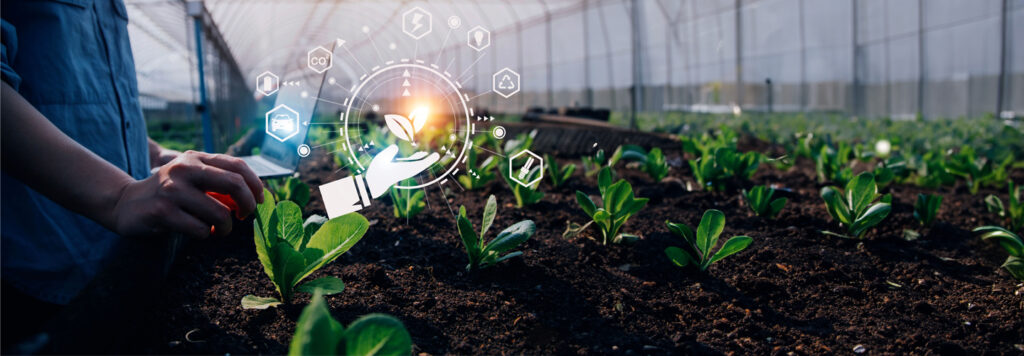Agriculture Management Strategies to Look Out For in 2024

The world of farming is always on the move, adapting to new technologies, changing consumer needs, and environmental concerns. As we step into 2024, agriculture is gearing up for some major shifts. It’s all about embracing digital tools, thinking green, and finding smarter ways to work. So, what’s on the horizon for agriculture management this year? Let’s take a closer look.
1. Precision Agriculture
Climate change will reduce global agricultural production by 17% by 2050, according to a study(make it nofollow link) by the Proceedings of the National Academy of Sciences. Agriculture today is going the digital way to be more efficient and precise. And guess what? It’s not going to stop there. In 2024, we’ll see even more improvements in these techniques, like better tools for precision farming. This includes:
- AI and Machine Learning: With AI & ML algorithms, agribusinesses can analyze loads of data collected from sensors, drones, and satellites to make quick, data-driven decisions.
- Precision Application Systems: These systems help farmers & agri-businesses use fertilizers, pesticides, and other inputs precisely, cutting down on waste and environmental harm.
- Sensor Technology: Advanced sensors, like soil moisture sensors and imaging devices, give farmers & agri-businesses detailed insights into soil health, crop growth, and environmental conditions, helping them take targeted action.
2. Farm Management Softwares
Today, farm management softwares are leading the charge and changing the game for agribusinesses everywhere. Picture this: instead of relying on gut feelings and guesswork, agribusinesses actually have access to real-time data, analytics, and tools. Wouldn’t that help them make better decisions? Let’s understand what’s in store for these platforms in 2024.
- Integration and Connectivity: By seamlessly blending different agricultural technologies and data sources, farms can run smoother and smarter.
- Mobile Solutions: Imagine being able to manage your farm from the palm of your hand, no matter where you are. It’s all about flexibility and productivity on the go. Which agribusiness manager wouldn’t want that?
- Collaborative Platforms: Information sharing among agribusinesses, researchers, and other stakeholders will enable innovation and knowledge exchange.
3. Sustainable Agriculture Practices
As we look ahead to 2024, it’s clear that concerns about the environment and climate change are only growing stronger. So, what are the solutions to overcome these challenges? Let’s take a look.
- Regenerative Agriculture: Regenerative agriculture practices such as cover cropping, crop rotation, and no-till farming will grow in popularity as agribusinesses will want to enhance soil health and improve resilience to extreme weather events.
- Agroecology: Agroecology emphasizes the integration of ecological processes into agricultural systems, which helps boost biodiversity, cut down on chemicals, and support ecosystem health.
- Climate-Smart Agriculture: Adoption of climate-smart agriculture techniques such as drought-tolerant crop varieties, precision irrigation systems, and carbon farming practices will enable agribusinesses to adapt to climate change impacts while not causing any impact on productivity.
4. Supply Chain Resilience
Remember when COVID-19 hit and suddenly everything seemed fragile? It made everyone understand that we need sturdy supply chains in farming. Here are some things to look out for in supply chains in 2024:
- Localized Supply Chains: With direct-to-consumer sales channels, agribusinesses are turning to localized food systems. This is helping reduce the reliance on faraway markets and the challenges associated with it.
- Blockchain Technology: By ensuring transparency, traceability, and food safety across the supply chain, blockchain technology can help boost trust in agricultural products.
- Diversification: Diversification of crops, markets, and distribution channels will be beneficial in tackling market fluctuations, trade disruptions, and other unexpected challenges.
5. Data-driven Decision Making
In an era of big data, analytics, and IoT, data-driven decision-making will be essential for optimizing agricultural operations and maximizing profitability. In 2024, agriculture management strategies will focus on:
- Data Integration and Interoperability: By integrating and standardizing data gathered from sensors, machinery, weather stations, etc, agribusinesses will make more informed decisions.
- Predictive Analytics: This will enable agribusinesses to anticipate market trends, weather patterns, pest outbreaks, and other factors affecting crop yields and profitability, facilitating proactive management strategies.
- Farm Management Software: Agribusinesses will start relying more on analytics and visualization tools that help with planning and optimizing end-to-end operations with ease.
6. Adaptive Management and Resilience Planning
The world today is becoming more and more unpredictable due to climate change, market ups and downs, and global politics. In such a time, it is important to always have a plan to adapt and bounce back from unexpected problems. What could be the key features of this plan? Let’s have a look.
- Risk Assessment and Scenario Planning: Agribusinesses pay careful attention to possible risks and prepare for various situations. This includes issues such as unpredictable weather, pests, shifts in consumer preferences, and changes in the market. By creating backup plans and exploring alternative approaches, agribusinesses can be prepared to overcome challenges and maintain the smooth functioning of their farms.
- Flexibility and Agility: Flexibility is another element that needs to be a part of the plans of agribusinesses. Now, flexibility means that agribusinesses need to be able to change plans and make decisions whenever required. This includes trying out different crops, experimenting with various farming techniques, and finding out ways to make the most of opportunities.
7. Reskilling and Training Initiatives
With each passing day, agriculture is becoming increasingly digitized and technology-driven. At such a time, reskilling and training initiatives will be essential for ensuring that agribusinesses have the knowledge and skills needed to make the most of the emerging technologies. What reskilling and training initiatives will be in focus in 2024? Let’s check out.
- Digital Literacy Programs: With training programs focused on digital literacy, data management, and technology adoption, agribusinesses will be able to make the most of digital tools and platforms in their operations.
- Continuous Learning Culture: By creating a culture of continuous learning and innovation, agribusinesses will be able to stay on top of technological advancements and best practices.
The Road Ahead: Agriculture Management in 2024
- Innovation, sustainability, and resilience are key elements.
- Adoption of the latest management strategies is crucial for success.
- Agribusinesses must navigate evolving challenges and opportunities.
As we look ahead to the future of farming, it is clear that those who adapt and innovate will thrive in the face of uncertainty, paving the way for a more resilient, sustainable, and prosperous agricultural sector. Get in touch to know more about how FarmERP can help you streamline your agriculture management practices.
